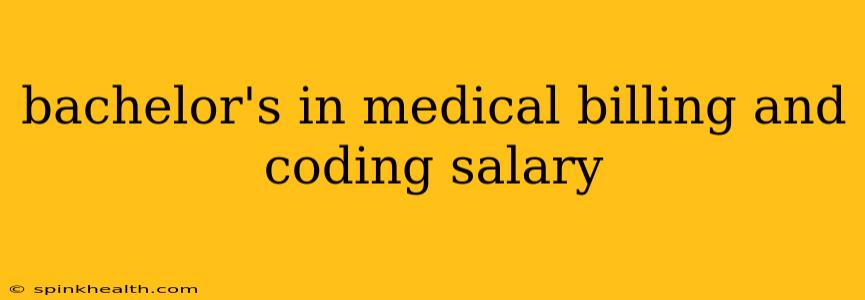Decoding the Dollars: What You Can Earn with a Bachelor's in Medical Billing and Coding
The crisp white coat, the hushed reverence of the hospital halls – medicine often conjures images of doctors and nurses. But behind the scenes, a critical force ensures the smooth operation of healthcare: medical billing and coding specialists. And with a bachelor's degree in this field, your earning potential takes a significant leap. Let's dive into the world of salaries and explore what a bachelor's in medical billing and coding can unlock for you.
My name's Sarah, and I've spent over a decade working in healthcare administration, witnessing firsthand the evolution of medical billing and coding. I've seen how a strong educational foundation translates into real-world success, leading to higher salaries and fulfilling careers. This isn't just about numbers; it's about making sure healthcare providers get paid fairly for their services and patients receive accurate and timely bills.
What is the average salary for a medical biller and coder with a bachelor's degree?
This is a question many aspiring medical billing and coding professionals ask, and the answer isn't a simple number. Salary depends on several factors, including experience, location, employer type, and specific skills. However, a bachelor's degree significantly boosts your starting point. You can expect to earn a considerably higher salary than someone with an associate's degree or certificate. While entry-level positions might start around $45,000 annually, experienced professionals with a bachelor's can easily earn $60,000 or more. In high-demand areas and with specialized certifications, the sky's the limit!
Think of it like this: a bachelor's degree isn't just a piece of paper; it's a passport to higher earning potential.
How does experience affect salary?
Experience is the golden ticket in any field, and medical billing and coding is no exception. As you gain more experience, your salary will naturally increase. Your initial salary after graduation will likely be lower than what you'll earn after a few years of honing your skills. Think of it as an investment – the more time and effort you put in, the greater the return.
Each year you add to your resume brings with it new expertise, improved efficiency, and a wider range of skills that employers will value. This expertise often translates into more responsibility and, ultimately, higher pay.
Does location impact salary?
Absolutely! Just like the cost of living varies across the country, so do salaries. Major metropolitan areas, such as New York City, San Francisco, and Boston, tend to offer higher salaries due to the higher cost of living and increased demand for skilled professionals. Rural areas or smaller cities might have lower average salaries, but this can be offset by a lower cost of living.
Before accepting a position, research the average salary for your target area to ensure you're receiving a competitive offer. Resources like Glassdoor and Salary.com can be excellent starting points.
What kind of employers hire medical billers and coders with bachelor's degrees?
The beauty of a medical billing and coding degree is the diversity of employment opportunities. You're not limited to hospitals! You could find yourself working in:
- Hospitals: A classic choice, offering a wide range of experiences and potential for advancement.
- Physician Practices: Working directly with doctors and their staff provides a unique perspective and often a closer working relationship.
- Insurance Companies: Gaining a deep understanding of insurance regulations and claims processing.
- Healthcare Consulting Firms: Leveraging your expertise to advise healthcare organizations on billing and coding best practices.
- Software Companies: Contributing to the development of medical billing and coding software.
The options are vast and varied, allowing you to choose a career path that aligns with your personal goals and preferences.
Are there any additional certifications that could increase my earning potential?
Yes! Obtaining certifications like the Certified Professional Coder (CPC) or Certified Professional Biller (CPB) can significantly boost your resume and earning power. These certifications demonstrate your expertise and commitment to excellence within the field, often leading to higher starting salaries and greater career advancement opportunities.
Think of them as the extra skills that set you apart from the competition, making you a highly sought-after candidate.
In conclusion, a bachelor's degree in medical billing and coding is a smart investment. It sets the stage for a lucrative and rewarding career in a constantly evolving field. While the exact salary will vary, with dedication, experience, and the right certifications, you'll be well on your way to building a fulfilling and financially secure future.

